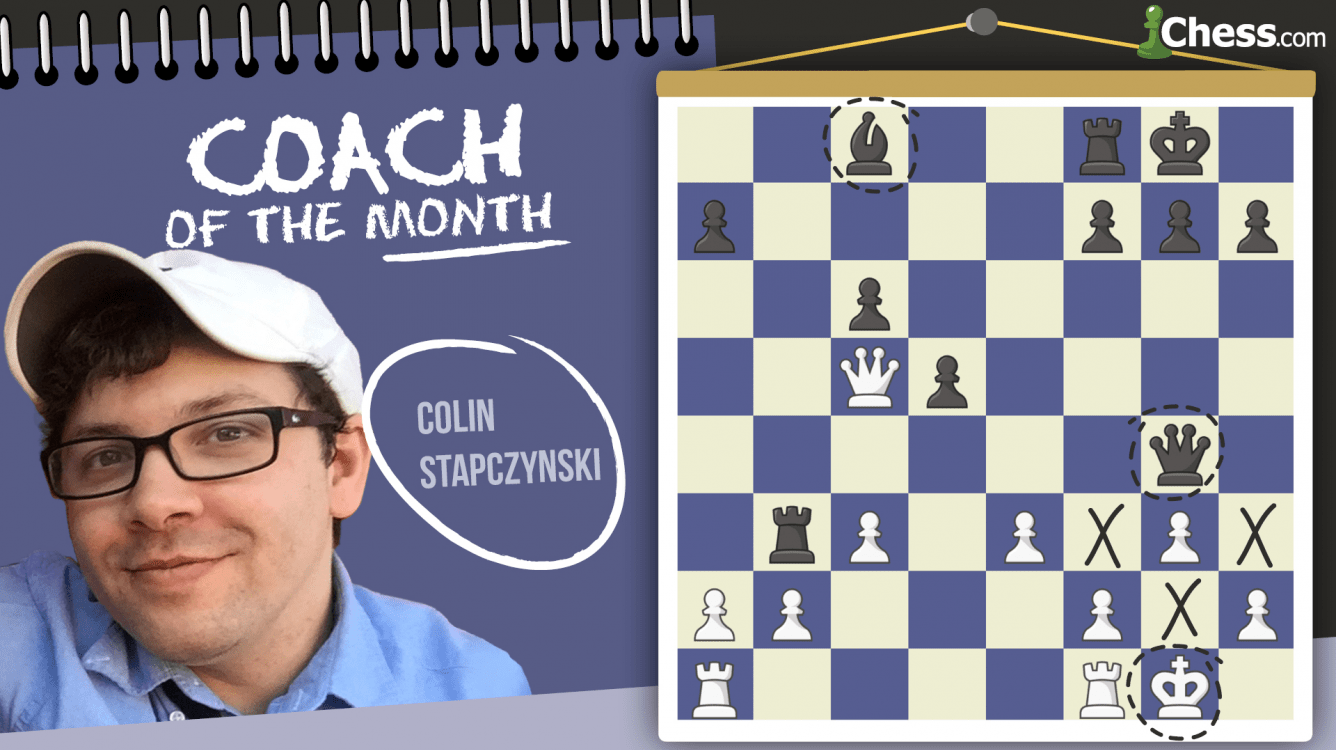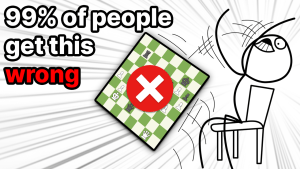
Coach Of The Month: Colin Stapczynski
Chess.com's newest Coach of the Month is Colin Stapczynski! Colin is a familiar face on Chess.com and Twitch with twitch.tv/thechesscouch, his channel that he runs with his brother. Colin has recently been contributing to the chess.com/players project—check out his articles and those by other great writers on the careers of famous chess players.
Readers seeking private instruction can contact Colin Stapczynski via his Chess.com profile (@colinstapczynski) and can find other skilled coaches at Chess.com/coaches.
Interview with Colin:
Chess.com: At what age were you introduced to chess, and who introduced you?
My father introduced me to chess when I was 6. My younger brother and I were given a chess set titled "Chess Teacher," which was unique because written on the plastic base of each piece was how it moved.
What is your first vivid memory from chess?
My first vivid chess memory is sitting in the driveway playing chess with my brother on the Chess Teacher set. We read and studied each piece as we played and learned how they moved.... The driveway is probably not the safest place for two young kids to be playing chess!
Which coaches were helpful in your chess career, and what was the most useful knowledge they imparted to you?
I have been lucky to work with more than a handful of strong coaches in my life. GM Gregory Kaidanov taught me that we show our personalities over the chessboard. This simple and true idea has shaped my entire life—from my decision to study psychology in school, to my choice to pursue a career in teaching chess. I have always been fascinated by the choices people make and (more importantly) why we make them.
Which game do you consider your masterpiece?
This is a very difficult exercise. To choose one game is so difficult! It feels like a lifetime since I played OTB chess, so I will pick a blitz game from an Arena Kings tournament I played last year while streaming. (I stream chess with my brother, Jeremy, on Twitch at www.twitch.tv/thechesscouch.)
How would you describe your approach to chess coaching?
My approach to chess coaching is methodical. First, I view around 10 of my student's games with them so I can have a better understanding of their strengths/weaknesses/personality types. Then I suggest new additions or changes to their opening repertoire—I strongly believe that a person's opening repertoire should suit their personality and style.
After getting a student's opening repertoire set up, we start learning about positional ideas, common middlegame plans and ideas that are common in their selected openings, and endgames.
Throughout this process, we continually analyze games selected by the student. Organic growth occurs using these methods, as well as previously unknown strengths and weaknesses. The systematic removal of these weaknesses is achieved by tailor-made lesson plans.
What do you consider your responsibilities as a coach, and which responsibilities fall on your student?
My responsibility as a coach is to help the student achieve their chess goals. Whether their goal is to get to a 2000 USCF rating or beat their grandfather or best friend, mental exercise, and most commonly general improvement and understanding—my responsibility is to give clear guidance to achieve these goals.
The responsibilities of the student differ, as everyone is different. ![]() The only thing that I require of all students is that they have fun while they improve at the royal game!
The only thing that I require of all students is that they have fun while they improve at the royal game!
What advice do you give your students that you think more chess players could benefit from?
Winning the "won" game does not come naturally for many players. After they win a piece in a game, they feel a lot of pressure to win and sometimes choose unsound plans or unsound attacks.
My advice after you win a piece? Relax! The hard part is over; you are winning. ![]() The pressure is on your opponent who is in a losing position, not you. Once you are winning, it is a perfect time to play "relaxed, yet vigilant." This is the mindset I have my students strive for while playing games.
The pressure is on your opponent who is in a losing position, not you. Once you are winning, it is a perfect time to play "relaxed, yet vigilant." This is the mindset I have my students strive for while playing games.
What is your favorite teaching game that users might not have seen?
The following game by GM Ulf Andersson is a personal favorite of mine—full of wonderful technique and winning with the tiniest of advantages. A beautiful and simple game!
What puzzle do you give students that tells the most about how they think?
I use many diagrams and puzzles with my students, but this king and pawn ending is very useful:
It is a great puzzle for many reasons:
- It has a little something for every type of player.
- It contains a common (yet advanced) king and pawn endgame theme.
- A lot of the moves can be found by using a simple process of elimination.
- It helps improve tactical and calculation vision, while also helping with multistep planning!
Do you prefer to teach online or offline? What do you think is different about teaching online?
I definitely prefer teaching online—the amount of tools available online is far superior than teaching in person. When teaching online, it is much faster to set up specific positions, to load games, and to access other information.
What do you consider the most valuable training tool that the internet provides?
Chess.com analysis board and Chess.com's newest feature, Puzzle Rush!
Which underappreciated chess book should every chess player read?
Chess Gladiator by Asa Hoffman. I carried this book around with me everywhere I went for an extended period of time. I have always been fond of game collection books, but Asa's book taught me a lot of secrets about closed positions—something that all chess players should learn. ![]()
Prior coach of the month winners:







